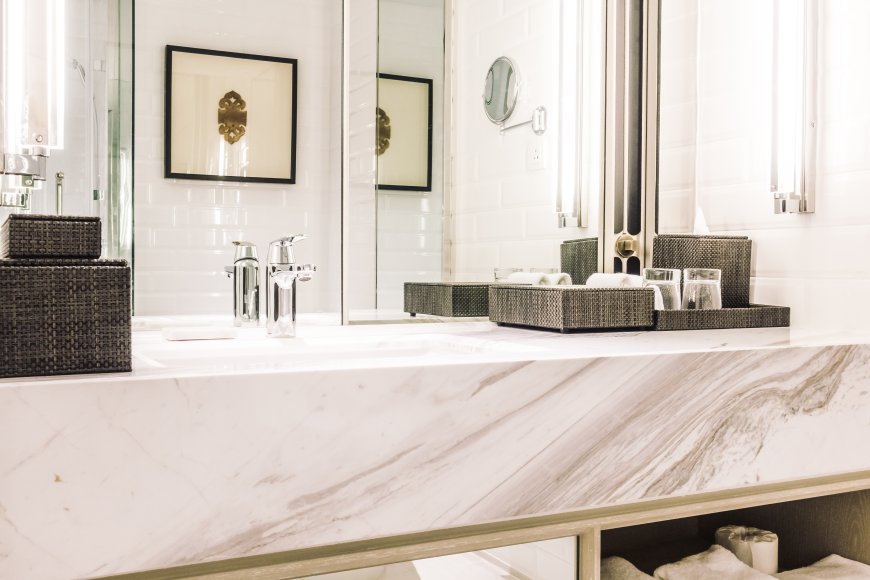Quartz vs. Granite vs. Marble: Which Kitchen Countertop is Best for You?
This comprehensive guide will compare quartz, granite, and marble in terms of composition, durability, maintenance, appearance, cost, and more to help you make an informed choice for your home.

Choosing the perfect kitchen countertop is a crucial decision in any home renovation or new build. The surface you select not only defines the overall aesthetic of your kitchen but also influences durability, maintenance needs, and long-term satisfaction. Among the many options available, quartz, granite, and marble remain the top contenders. But how do you know which one suits your lifestyle, design preference, and budget?
This comprehensive guide will compare quartz, granite, and marble in terms of composition, durability, maintenance, appearance, cost, and more to help you make an informed choice for your home.
1. Understanding the Basics
Quartz
Quartz countertops are engineered stone products made from about 90-95% ground natural quartz mixed with resins and pigments. This manufacturing process creates a non-porous, uniform surface that mimics the look of natural stone while offering superior durability.
Granite
It contains various minerals like quartz, feldspar, and mica, which contribute to its unique color and pattern. No two granite countertops are ever exactly the same, giving your kitchen a distinct character.
Marble
It’s revered for its luxurious, veined appearance and has long been associated with high-end interiors and classic architecture.
2. Appearance and Aesthetic Value
Quartz
Quartz offers a wide range of colors and patterns, many of which mimic natural stones like marble and granite. Because it is engineered, quartz can provide a more consistent look across larger surfaces, making it a favorite for modern, minimalist, or uniform design aesthetics.
Granite
Granite's natural formation gives it unique swirls, veins, and speckles. The variation in color and texture provides a more organic, earthy look. It's ideal for homeowners seeking something original and rich in character.
Marble
Marble is the epitome of elegance. Its soft, flowing veins and subtle color palette—typically white, grey, and beige—add sophistication to any kitchen. Marble suits classic, luxurious, or traditional styles but also works well in contemporary spaces with the right finish.
3. Durability and Resistance
Quartz
Since it is non-porous, it resists bacteria and mold growth, making it a hygienic choice. It’s also less likely to crack or chip under normal use.
Granite
Granite is one of the hardest natural stones available and is highly resistant to heat and scratches. However, since it is porous, it can absorb liquids if not properly sealed, leading to potential stains and bacteria growth.
Marble
Marble is softer than both granite and quartz, making it more prone to scratches, etching, and stains. It reacts to acidic substances like lemon juice and vinegar, which can leave dull spots or marks if not wiped up quickly.
4. Maintenance Requirements
Quartz
Quartz countertops are low-maintenance. Daily cleaning with soap and water or a mild cleaner is sufficient. Because it's non-porous, it doesn’t require sealing or special treatments.
Granite
Granite requires periodic sealing (usually once a year) to maintain its resistance to stains and moisture. Regular cleaning with a pH-neutral cleaner is recommended to avoid damaging the sealant.
Marble
Marble needs more frequent sealing and gentle care to preserve its look. Avoid abrasive cleaners and be cautious of acidic foods or spills. A soft cloth and pH-neutral stone cleaner are best for daily maintenance.
5. Heat and Scratch Resistance
Quartz
While quartz is durable, it is not as heat resistant as granite. Placing hot pans directly on a quartz surface may cause damage. However, it's highly scratch-resistant, making it ideal for busy kitchens.
Marble
Marble has moderate heat resistance but can be damaged by direct contact with hot cookware. It is also more susceptible to scratches, especially in high-traffic kitchens or where sharp tools are regularly used.
6. Cost Comparison
Quartz
Quartz is typically priced between $50 to $120 per square foot, including installation. While not the cheapest, quartz offers excellent value for money due to its durability and low maintenance.
Granite
Granite prices range from $40 to $100 per square foot. More exotic colors or rare patterns can cost more. Although initial costs may be lower than quartz, ongoing maintenance (like sealing) adds to the long-term expense.
Marble
Marble tends to be the most expensive, averaging $70 to $150 per square foot. Carrara marble is generally more affordable than Calacatta, but all types require higher maintenance and upkeep costs.
7. Environmental Impact
Quartz
Quartz countertops are engineered, meaning they require energy and resins for production. However, many manufacturers now offer eco-friendly quartz options using recycled materials and sustainable processes.
Granite
Granite is natural, but quarrying and transporting heavy slabs across long distances can have a notable environmental impact.
Marble
Marble is also a natural resource, and like granite, its quarrying and shipping contribute to environmental degradation. Reclaimed or repurposed marble can be a greener option if available.
8. Best Use Cases
Quartz: Best for Busy Families
Quartz is ideal for families who want a low-maintenance, durable, and stylish countertop for kitchen. Its non-porous surface makes it resistant to spills, stains, and microbes—perfect for everyday use.
Granite: Best for Natural Stone Lovers
Granite is the go-to for homeowners who love the beauty and uniqueness of natural stone. It’s tough, heat-resistant, and makes a strong visual impact. With proper care, it can last for decades.
Marble: Best for Style-Conscious Homeowners
Marble is perfect for those who prioritize aesthetics and are willing to maintain it properly. It’s a statement piece in any kitchen and works well in spaces where cooking is more occasional than daily.
9. Resale Value and Appeal
All three countertop materials—quartz, granite, and marble—can increase your home's resale value, but the impact depends on the buyer's preferences.
-
Quartz appeals to modern buyers due to its practicality and uniform look.
-
Marble often attracts luxury-oriented buyers looking for classic elegance.
Choosing the right kitchen counter tops can enhance your kitchen’s appeal and potentially boost your home’s market value.
Conclusion: Which Countertop is Best for You?
When choosing between quartz, granite, and marble, there’s no universal “best” option—only what best suits your specific needs, lifestyle, and budget.
-
Choose Quartz if you want an easy-care surface with a modern appearance and high durability.
-
Opt for Granite if you prefer a unique, natural look and don’t mind periodic maintenance.
-
Go with Marble if you love the elegance and luxury it brings, and are prepared to invest in its care.
Ultimately, your countertop is an investment in your home’s functionality and style. By weighing the pros and cons of each material, you’ll be better equipped to make the best decision for your dream kitchen.













































































































![Are AI Chatbots Replacing Search Engines? AI vs Google [New Research]](https://www.orbitmedia.com/wp-content/uploads/2025/05/How-often-are-we-using-AI-chatbots_.webp)


















































